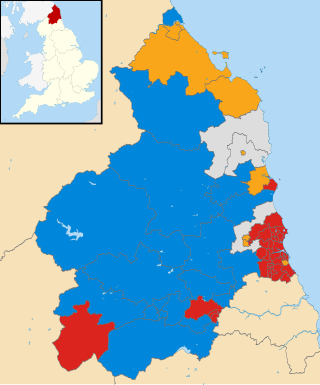
Tyne and Wear is a ceremonial county in North East England. It borders Northumberland to the north and County Durham to the south, and the largest settlement is the city of Newcastle-upon-Tyne.

Diana Margaret Maddock, Baroness Maddock, Lady Beith was a British Liberal Democrat politician. She was elected as Member of Parliament (MP) for Christchurch in a 1993 by-election but lost the seat at the subsequent 1997 general election to Conservative Christopher Chope. She re-entered Parliament as a life peer as Baroness Maddock, of Christchurch in the County of Dorset, in 1997 where she remained until her death.

Hexham is a constituency in Northumberland represented in the House of Commons of the UK Parliament since 2010 by Guy Opperman, a Conservative. As with all constituencies, the constituency elects one Member of Parliament (MP) by the first past the post system of election at least every five years.

Blyth Valley, formerly known as Blyth, is a constituency represented in the House of Commons of the UK Parliament since 2019 by Ian Levy, a Conservative.

Metropolitan and non-metropolitan counties are one of the four levels of subdivisions of England used for the purposes of local government outside Greater London and the Isles of Scilly. As originally constituted, the metropolitan and non-metropolitan counties each consisted of multiple districts, had a county council and were also the counties for the purposes of Lieutenancies. Later changes in legislation during the 1980s and 1990s have resulted in counties with no county council and 'unitary authority' counties with no districts. Counties for the purposes of Lieutenancies are now defined separately, based on the metropolitan and non-metropolitan counties.
Northumberland County Council elections are held every four years. Northumberland County Council is the local authority for the unitary authority of Northumberland in England. Since the last boundary changes in 2013, 67 councillors have been elected from 66 wards.

Northumberland County Council is a unitary authority in North East England. The population of the non-metropolitan unitary authority at the 2011 census was 316,028.

The 2008 United Kingdom local elections were held on 1 May 2008. These elections took place in 137 English Local Authorities and all Welsh Councils.

Elections to Northumberland County Council were held on 2 May 2013. The full council was up for election, with each successful candidate serving a four-year term of office, expiring in 2017.

Local elections to Northumberland County Council, a county council in the north east of England, were held on 1 May 2008, resulting in a council with no overall control and with Liberal Democrat members forming the largest political group on the new unitary authority Council.

Local elections to Northumberland County Council, a county council in the north east of England, were held on 5 May 2005, resulting in a council with Labour members forming a majority.

Local elections to Northumberland County Council, a county council in the north east of England, were held on 7 June 2001. It was the first election to be held under new ward boundaries that increased the number of seats from 66 to 67. The Labour Party retained overall control of the council.

An election for the Northumberland County Council took place on 4 May 2017 as part of the 2017 local elections in the United Kingdom. All 67 councillors were elected from 66 electoral divisions which returned either one or two county councillors each by first-past-the-post voting for a four-year term of office.

Local elections to Northumberland County Council, a county council in the north east of England, were held on 6 May 1993, resulting in a council with Labour members forming a majority.
Local elections to Northumberland County Council, a county council in the north east of England, were held on 12 April 1973, resulting in a council with no party forming a majority.
Local elections to Northumberland County Council, a county council in the north east of England, were held on 5 May 1977, resulting in a council with no party forming a majority.

Local elections to Northumberland County Council, a county council in the north east of England, were held on 7 May 1981, resulting in a council with Labour members forming a majority.

Local elections to Northumberland County Council, a county council in the north east of England, were held on 2 May 1985. The Labour Party lost overall control of the council, which fell under no overall control.

Local elections to Northumberland County Council, a county council in the north east of England, were held on 4 May 1989, resulting in a council with Labour members forming a majority.

An election for the Northumberland County Council took place on 6 May 2021 as part of the 2021 local elections in the United Kingdom. All 67 councillors were elected from 66 electoral divisions which returned either one or two county councillors each by first-past-the-post voting for a four-year term of office.

















